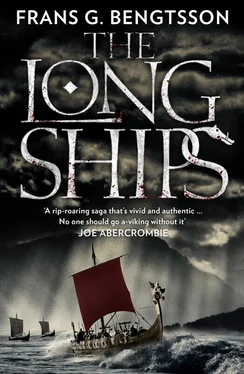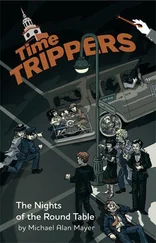So after that, Asa and Toste had only two sons left. The elder of these was called Odd. He was a short youth, coarsely built and bow-legged, but strong and horny-handed, and of a reflective temper; he was soon accompanying Toste on his voyages, and showed himself to be a skilful shipman, as well as a hard fighter. At home, though, he was often contrary in his behaviour, for he found the long winters tedious, and Asa and he bickered continually. He was sometimes heard to say that he would rather be eating rancid salt-meat on board ship than Yuletide joints at home; but Asa remarked that he never seemed to take less than anyone else of the food she set before them. He dozed so much every day that he would often complain that he had slept poorly during the night; it did not even seem to help, he would say, when he took one of the servant-girls into the bed-straw with him. Asa did not like his sleeping with her servants; she said it might give them too high an opinion of themselves and make them impudent towards their mistress; she observed that it would be more satisfactory if Odd acquired a wife. But Odd replied that there was no hurry about that; in any case, the women that suited his taste best were the ones in Ireland, and he could not very well bring any of them home with him for, if he did, Asa and they would soon be going for one another tooth and nail. At this, Asa became angry and asked whether this could be her own son who addressed her thus, and expressed the wish that she might shortly die; to which Odd retorted that she might live or die as she chose, and he would not presume to advise her which state to choose, but would endure with resignation whatever might befall.
Although he was slow of speech, Asa did not always succeed in having the last word, and she used to say that it was in truth a hard thing for her to have lost three good sons and to have been left with the one whom she could most easily have spared.
Odd got on better with his father, however, and, as soon as the spring came, and the smell of tar began to drift across from the boat-house to the jetty, his humour would improve, and sometimes he would even try, though he had little talent for the craft, to compose a verse or two – of how the auk’s meadow was now ripe for ploughing; or how the horses of the sea would shortly waft him to the summer land.
But he never won himself any great name as a bard, least of all among those daughters of neighbouring thanes who were of marriageable age; and he was seldom observed to turn his head as he sailed away.
His brother was the youngest of all Toste’s children, and the jewel of his mother’s eye. His name was Orm. He grew quickly, becoming long and scatter-limbed, and distressing Asa by his lack of flesh; so that whenever he failed to eat a good deal more than any of the grown men, she would become convinced that she would soon lose him, and often said that his poor appetite would assuredly be his downfall. Orm was, in fact, fond of food, and did not grudge his mother her anxiety regarding his appetite; but Toste and Odd were sometimes driven to protest that she reserved all the tit-bits for him. In his childhood, Orm had once or twice fallen sick, ever since when Asa had been convinced that his health was fragile, so that she was continually fussing over him with solicitous admonitions, making him believe that he was racked with dangerous cramps and in urgent need of sacred onions, witches’ incantations and hot clay platters, when the only real trouble was that he had overeaten himself on corn porridge and pork.
As he grew up, Asa’s worries increased. It was her hope that he would, in time, become a famous man and a chieftain; and she expressed to Toste her delight that Orm was shaping into a big, strong lad, wise in his discourse, in every respect a worthy scion of his mother’s line. She was, though, very fearful of all the perils that he might encounter on the highway of manhood, and reminded him often of the disasters that had overtaken his brothers, making him promise always to beware of bulls, to be careful on board ship, and never to lie with other men’s wives; but, apart from these dangers, there was so much else that might befall him that she hardly knew where to begin to counsel him. When he reached the age of sixteen, and was ready to sail with the others, Asa forbade him to go, on the ground that he was still too young and too fragile of health; and, when Toste asked her whether she had it in her mind to bring him up to be a chieftain of the kitchen and a hero of old women, she exploded into such a rage that Toste himself became frightened, and let her have her way, and was glad to be allowed to take his own leave, and, indeed, lost little time in doing so. That autumn, Toste and Odd returned late from their voyage, and had lost so many of their crew that they scarcely had enough left to man the oars; nevertheless, they were well contented with the results of their expedition, and had much to relate. In Limerick, they had met with small success, for the Irish kings in Munster had by now become so powerful that the Vikings who lived there had their work cut out to hold on to what they had. Then, however, some friends of Toste (who had anchored his ship off the coast) had asked whether he might feel inclined to accompany them on a secret visit to a great midsummer fair which was held each year at Merioneth, in Wales, a district to which the Vikings had not previously penetrated, but which could be reached with the assistance of two experienced guides whom Toste’s friends had discovered. Their followers being enthusiastic, Odd had persuaded Toste to fall in with this suggestion; so seven shiploads of them had landed near Merioneth and, after following a difficult route inland, had managed to arrive at the fair without giving wind of their approach. There had been fierce fighting, and a good many men had been killed, but in the end the Vikings had prevailed and had captured a great quantity of booty, as well as many prisoners. These they had sold in Cork, making a special voyage thither for the purpose, for it had long been the custom for slave-traders to gather in Cork from all the corners of the world to bid for the captives whom the Vikings brought there; and the king of those parts, Olof of the Precious Stones, who was a Christian and very old and wise, would himself purchase any that caught his fancy, so that he might give their kinsmen the opportunity to ransom them, on which transaction he could be sure of making a pretty profit. From Cork, they had set out for home, in company with a number of other Viking ships in case of pirates, for they had little appetite for further fighting, weakly manned as they now were, besides having much treasure aboard. So they had succeeded in coming unscathed round the Skaw, where the men of the Vik and of Westfold lurked in ambush to surprise richly laden ships returning homewards from the south and west.
After the survivors of the crew had been allotted their share of the booty, a great quantity remained for Toste; who, when he had weighed it and locked it into his treasure-chest, announced that an expedition such as this would serve as a fitting conclusion to his wanderings, and that henceforth he would remain at home, the more willingly since he was beginning to grow somewhat stiff of limb; Odd was by now capable of managing the affairs of the expeditions fully as well as he, and would, besides, have Orm to help him. Odd thought that this was a good idea; but Asa was of a very different opinion, observing that, whilst a fair amount of silver had been won, it could hardly be expected to last for long, considering how many mouths she had to feed each winter; besides which, how could they be sure that Odd would not spend all the prize-money he won in future expeditions on his Irish women, or indeed whether, left to himself, he would ever bother to come home to them at all? As regards the stiffness which Toste complained of in his back, he ought by now to know that this was not the result of his voyages but of the months that he spent idling in front of the fire throughout each winter; and to be falling over his sprawling legs for six months in every year was quite sufficient for her. She could not understand (she continued) what men were coming to nowadays; her own great-uncle, Sven Rat-Nose, a mighty man among the Göings, had fallen like a hero fighting the Smalanders three years after drinking the whole company under the table at his eldest grandson’s wedding; whereas, now, you heard talk of cramps from men in the prime of life who were apparently quite willing to die, unashamedly, on their backs in straw, like cows. However, she concluded, all this could be settled in good time, and meanwhile Toste and Odd and the others who had come home with them were to drown their worries in good ale, of a brew that would please their palates; and Toste was to put these nonsensical ideas out of his head and drink to an equally profitable expedition next year; and then they would all enjoy a comfortable winter together, so long as nobody invented any more of such stupid notions to provoke her, which she trusted they would not.
Читать дальше












